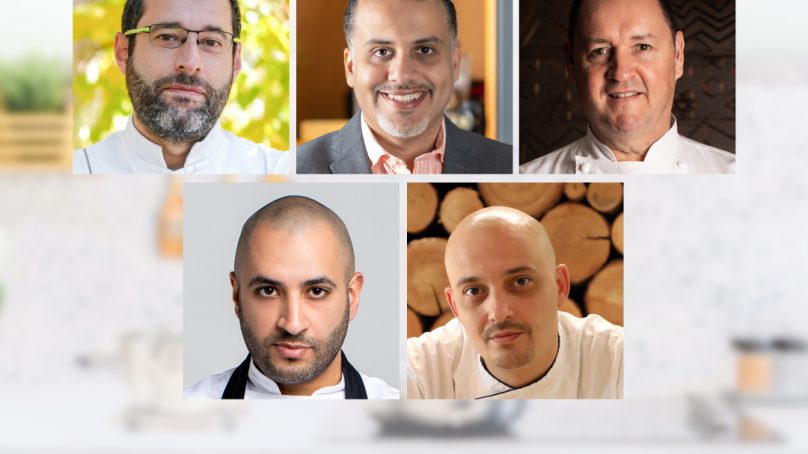
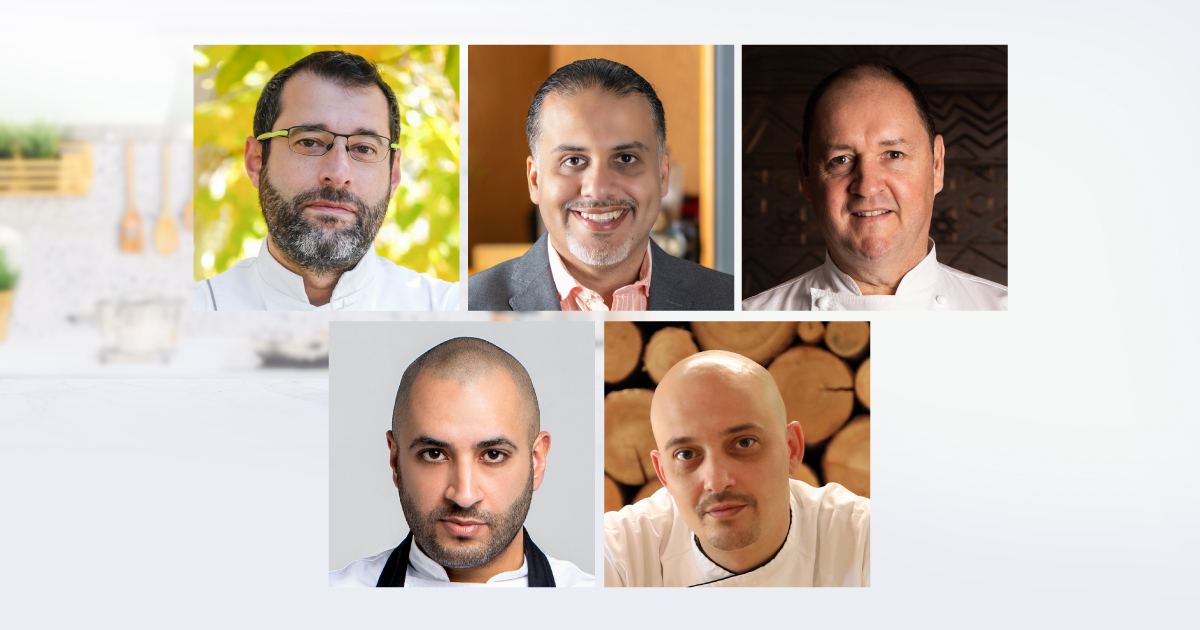
A global approach
There are several trends making waves in the meat segment, with global flavors and fusion leading the way. Think jerk flavor with kim chi salad, for example, where diverse cuisines are blended together. Chefs are experimenting with international spices, sauces and cooking techniques to create unique and diverse beef dishes. They are also exploring alternative cooking methods, such as sous-vide, smoking and braising, to achieve different textures and flavors in beef dishes. Dry-aging beef has become a popular approach to enhance flavor and tenderness. Other trends of note include a focus on artisanal and craft approaches and customization, with chefs allowing diners to choose preferred cooking styles and accompaniments. Significantly, a rise in street food and casual formats is making high quality beef accessible in more casual settings. Another trend in evidence is restaurants incorporating interactive elements into their beef dishes, such as tableside grilling and carving, or presentations that engage diners in the processes involved.
Flavorful cuts
We are seeing a growing interest in utilizing alternative cuts in the kitchen, with chefs exploring lesser-known, flavorful cuts. These include chuck short ribs which are fantastic when braised, and shank, which is often used in soups or osso buco. While ground beef immediately prompts ideas of burgers, there are other blends and applications for it, in dishes like Japanese katsu and kafta, for example.
Creating a wow factor
The starting point has to be using top quality ingredients, like the Certified Angus Beef ® brand. Bringing creativity to dishes by experimenting with innovative techniques and methods will help to give a wow factor. I’m also a great believer in the importance of storytelling – for example, we ensure the story of our top quality beef is fully understood, from
its taste and source to its certification. Striving to achieve consistency must also be a priority.

YOUSSEF AKIKI
Chef-owner at Brût, managing partner at Butler’s Table of Kitchen Backstage
Board member of The Syndicate of Owners of Restaurants in Lebanon, Lebanon
youssefakiki.com
@chefyoussefakiki
Quality is key
My culinary journey has taught me that the key to a successful kitchen lies in the quality of the tools used. Durable, high-quality tools not only save money longer term, but also ensure even cooking and consistent results,
which are crucial in my kitchen. For me, essential tools include:
• Cookware – I prefer high-grade pots, pans and baking sheets made from materials like stainless steel, cast iron and non-stick surfaces.
• Blenders/food processors – these are lifesavers for creating smooth sauces and pureeing ingredients.
• Thermometers – a reliable thermometer ensures food safety and precision.
• Quality knives: a set of top-notch chef’s knives, including paring knives and serrated knives, is at the core of my culinary creations for precise and efficient cutting and slicing.
Prioritizing efficiency and safety
• When selecting utensils, my key criteria are durability, ease of cleaning, material safety and ergonomic design. These aspects are crucial for efficiency and safety.
• Well-maintained utensils help to ensure consistent food preparation and prevent contamination and unwanted flavors.
• Regular cleaning is also critical in this regard to avoid food-borne illnesses.

FAISAL AHMED ALDELEIGAN
CEO at Chef Faisal Consultancy, Bahrain and Saudi Arabia
chefaisal.com
@cheffaisalco
Essential equipment
Must-have kitchen tools that can elevate a chef’s culinary skills include high-quality knives, a reliable set of pots and pans, precision measuring tools, a quality cutting board and versatile utensils, like spatulas and whisks. Specialized tools such as a mandoline slicer, immersion circulator and a digital meat thermometer, can also enhance a chef’s performance in the kitchen.
Right tools for the job
Commercial kitchen utensils play a crucial role in impacting the taste, quality and safety of food. The selection of utensils should prioritize materials that are safe for food contact, easy to clean and durable. Regular cleaning and proper maintenance are essential to prevent cross-contamination and ensure optimal performance. Stainless steel utensils are often preferred for their durability, resistance to corrosion and ease of sanitization. However, it is important to ensure the equipment is appropriate to the cuisine you are preparing to ensure authenticity and taste.
Smart and green
Emerging trends in kitchen equipment include smart appliances that offer connectivity and automation, sustainable and eco-friendly kitchen tools, and innovations in food preservation techniques. Chefs should also stay informed about advances in precision-cooking technology, such as sous-vide equipment, and explore tools to assist with on-trend methods of pickling and fermenting.
Personal preferences
There are many great brands of kitchen equipment. Key popular and reputable kitchen equipment brands include Marrone for custom-made kitchens, All-Clad and Staub for cookware, KitchenAid and Vitamix for equipment, and hand-crafted Japanese cooks’ knives. However, the choice of a favorite brand often depends on individual preferences, specific needs and the type of cuisine a chef specializes in.
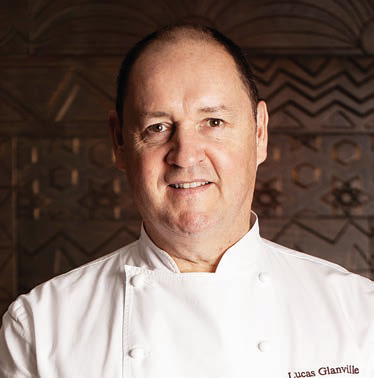
LUCAS GLANVILLE
Senior executive chef at Four Seasons Hotel Riyadh, KSA
fourseasons.com
@cheflucasglanville
Perfect for prep
A high-quality chef’s knife is an essential tool, since it enables users to become more efficient when working on their prep. Presenting food in an attractive manner always includes placing some sort of garnish on a plate which makes tweezers another must-have item. Much better than fingers, tweezers are ideal for delicately controlling the placement and movement of a garnish.
Made to last
Stainless steel and high-quality, hard plastic have great qualities that make them ideal for the pressures that we have to deal with daily in a kitchen. They are long-lasting, do not rust, are heavy duty and easy to clean. A utensil must also be the right size and material for its role; for example, using a small whisk in a big saucepan would not be especially effective, while a rubber spatula is unlikely to work when creating a choux pastry, which needs to be vigorously beaten.
Cutting edge cookers
New trends emerge every year and we’re always looking for the latest gadgets to help us with e´ciency in our preparation or elevate the textural elements of our dishes. One product that caught my eye last year was the air cooker. The technology controls cooking through steam, due to the tight rubber lock on the oven, which acts as an insulator, ensuring ultimate moistness for proteins or a very high steam injection for baked goods. Another oven which stood out was the Forza STi. Merging the turbo chef speedy cooking with your average deck, this oven cooks a pizza in around three minutes max.
Masterful and multi-functional
Staub is a French, enameled cast-iron pan renowned for its sturdiness and quality. It is highly popular in French kitchens, where it is used as a frying pan and also performs many other functions, including being placed in high heat environments, like ovens, for baking, frying and searing.
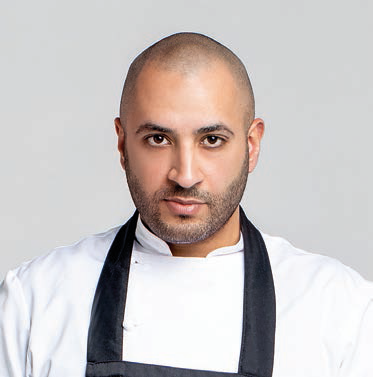
FAISAL AL NASHMI
Culinary director at Almakan United Company, Kuwait
almakan-kw.com
@zubaskitchen
Culinary checklist
In the culinary world, having the right kitchen tools is essential for chefs to excel in their craft. Key must-have kitchen tools that can significantly elevate a chef’s culinary skills are:
• A high-quality chef’s knife
• A rubber spatula
• A probe
• An immersion blender
• A kitchen scale
• A Microplane grater
• A Thermomix multi-functional kitchen appliance
Wise buys
I advise choosing utensils that are made of high-quality materials, such as stainless steel or heat-resistant silicone, which are durable, non-reactive and easy to clean. Ergonomics is also important. I suggest opting for utensils with comfortable handles and ergonomic designs, which improve the grip and reduce fatigue. For safety, look for utensils with features like heat-resistant handles, non-slip grips and thumb rests to ensure safe handling and prevent accidents. Once in use, utensils should be regularly cleaned with hot water and mild detergent, and sanitized to prevent bacteria.
High-tech trends
As chefs, it is important to stay updated on emerging trends and innovations in kitchen equipment. Some notable ones include:
• Sous-vide cooking
• Immersion systems like ImmersaFlex
• Smart kitchen appliances
• Sustainable kitchen equipment
• PathSpot technology, networked with the company’s HandScanner technology.
Personal priorities
I prioritize the quality, performance and reliability of kitchen tools over any specific brand. Several reputable brands offer excellent products and my preference may vary depending on the specific tool or
equipment required.
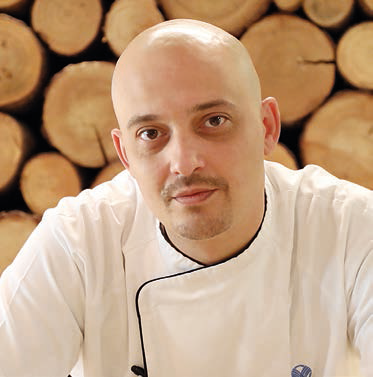
ROBERTO SAGLIMBENE
Executive chef at Saadiyat Rotana Resort and Villas, Abu Dhabi, UAE
rotana.com
@saadiyatrotana













